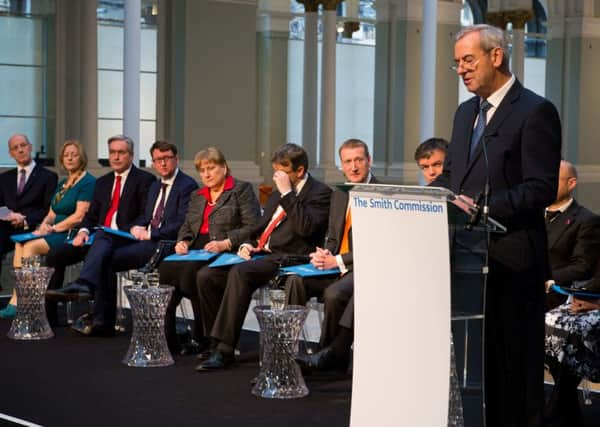Smith Commission: Holyrood power plans ‘fall short’


David Cameron has pledged to implement Lord Smith of Kelvin’s proposals in full following the SNP’s election victory - but a Holyrood committee, which includes Lib Dem and Tory MSPs, today said the UK government plans fall short of the original recommendations.
Concerns were raised over proposals for more welfare, income tax, the fiscal framework and Parliamentary oversight in a report by the Devolution (Further Powers) Committee.
Advertisement
Hide AdAdvertisement
Hide AdThe new Scottish Secretary David Mundell is now being urged to reflect on the concerns highlighted during the inquiry.
The three pro-UK parties made a “vow” of more powers for Scotland in the final days of the independence referendum campaign, which spawned the Smith Commission on Devolution following the No vote.
It comes the day before First Minister Nicola Sturgeon and David Cameron are due to hold talks in Edinburgh about SNP calls for the new powers to be enhanced.
Nationalist committee convener Bruce Crawford said: “The committee believes that the current proposals do not yet meet the challenge of fully translating the political agreement reached in the Smith Commission into legislation.
“For example, as we heard in our evidence taking, there is no power for the Scottish Parliament to top up reserved benefits despite that being one of the powers highlighted at the time of publication. The committee also seeks reassurance that any new benefits or top-up benefits introduced in Scotland would result in additional income for a recipient.
“The committee is disappointed that the currently proposed legislation sells Smith short.”
On welfare, the report says that the Scottish Parliament should have the power to create new benefits in areas of devolved responsibility and also new powers to make “discretionary” payments in any area without permission from Westminster.
Scotland would also get full control over income tax rates and bands under the plans, but the committee warns there are “significant issues” over the definition of residency for a Scottish taxpayer and the need to avoid double taxation.
Advertisement
Hide AdAdvertisement
Hide AdConservative MSP Alex Johnstone said the draft clauses are “imperfect” and lack clarity on benefits and welfare.
Liberal Democrat Tavish Scott, who sat on the Smith Commission alongside SNP MSP Linda Fabiani, has demanded the new Tory Government put the full intent of Smith into law.
Mr Crawford commended the “dispassionate” way the cross-party MSPs conducted their scrutiny of the clauses.
Mr Johnstone said: “What we have here, on studying it, is imperfect.
“I would highlight for example the area of tax where there is simplicity and clarity, but comparing that with the area of benefits and welfare there is a lack of clarity.
“The problem is what we have been presented with is hard to interpret - it could mean a number of things in a number of areas.
“Given the very complex situation that will arise when this is implemented, that complexity at the start is not desirable.”
Mr Scott said: “It is civil servants that draft clauses, but politicians ultimately have to agree them.
Advertisement
Hide AdAdvertisement
Hide Ad“I know what Smith wanted to do, I know what we negotiated, I know what therefore has to be given effect by incoming legislation that will at some stage this year be put in front of the House of Commons.
“So I have no difficulty whatsover, having been with Linda on the Smith Commission, in demanding that the full intent of what we agreed on a cross-party basis is implemented by the new UK Government.
“It doesn’t really matter what has happened in the past.”
Mr Crawford said: “We have taken a dispassionate, pretty mature, examination of the clauses compared with what Smith said, and being dispassionate about it is the job of a parliamentary committee.”